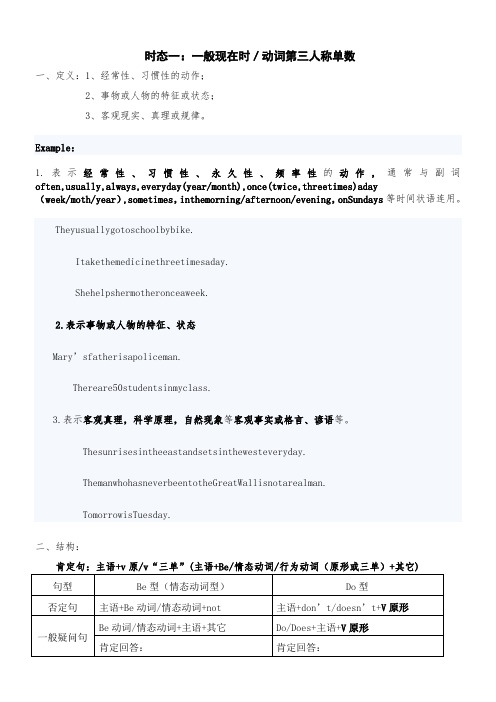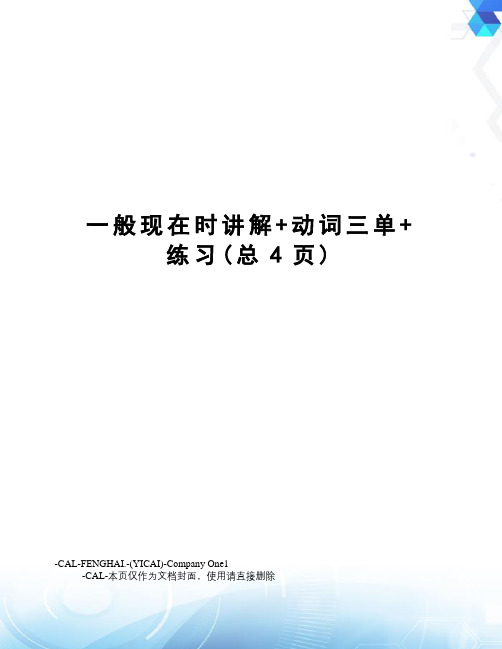一般现在时课件+练习(动词三单)
小学英语一般现在时三单动词的变化规则及练习题

在句子中,一般现在时三单动词的变化规则可以用来描述事实、表达观点 或传达信息。
通过使用一般现在时三单动词的变化规则,可以使句子更加简洁、明了, 易于理解。
在英语学习中,掌握一般现在时三单动词的变化规则在实际中的应用非常 重要,可以提高语言表达能力。
一般现在时三单 动词的变化练习
题
单选练习题
一般现在时态中,动词第三人称单数的变化规则是:A. 动词原形 B. 动词+s C. 动词+es D. 动词+ing
下列句子中,动词形式正确的是:A. He like playing basketball B. She goes to school at 7:00 every day C. They like to eat apples D. We don't like to play in the rain
在日常交流中的应用
描述日常行为和习惯
表达经常发生的动作或状态
描述事物的性质和特征
表达个人的喜好和意愿
在写作中的应用
描述日常行为和习惯
表达个人观点和喜好
描述事件和经历
编写故事和虚构情境
感谢您的观看
汇报人:XX
下列句子中,动词形式不正确的是:A. He plays basketball every day B. She eats an apple every morning C. They like eat apples D. We don't like to play in the rain
下列句子中,动词形式正确的是:A. He doesn't like to eat vegetables B. She doesn't like playing the piano C. They don't like to read books D. We don't like eating apples
小学英语一般现在时 第三人称单数 动词三单变化规则课件ppt

动词的三单变化
1、She studies English well. 2、Mike flies a kite. 3、Lucy play games every day. 4、The girl carries the box.
动词的三单变化 4、特殊变化
have — has go — goes do — does
单项选择
1.Ben_____a new bicycle. A.have B.has C.are D.were 2.Kitty_____her bicycle to the park. A.ride B.riding C.rides D.ridden 3.A man _____in front of his car. A.walk B.walks C.walking D.work 4.Sam’s bicycle ______a bell. A.have B has C.having D.is having 5.The girl _______ “Excuse me” A.say B.saying C.says D.sayes
单项选择
6.Mike______not like his bike. A.do B.is C.does D.are 7.He ______apples. A.likes B.like C.does D.are 8.He_______with his nose. A.smelling B.smells C.smell D.is smell 9.Lucy_______with her hands. A.touch B.touching C.touches D.touchs
studies finishes has lunch runs buys
综合练习
一般现在时总结ppt课件

• Do the Greens often go swimming in summer?
• Yes,the Greens do./No,the Greens do not.
• Yes,it is./No,it is not.
精选课件
12
注意:当句子中没有be动词,也没有情态 动词时,变一般疑问句时,在主语前加助 动词do (I, we, you,以及复数), does(第三 人称单数she,he,it等)变成问句;
精选课件
13
• Do +主语(除第三人称单数) +动词原形+其它成 分?
• try---tries study---studies
• cry---cries fly---flies
• 2.不规则变化:be---- is have----has
精选课件
7
•归纳:第三人称单数
• 人称代词he, she, it是第三人称单数。
• He likes watching TV. 他喜欢看电视。
精选课件
4
(3)表示客观现实。
• The table has four legs.桌子有四条腿。
• There are 50 students in my class.
• 我们班有50个学生。
(4)表示客观真理,科学原理,自然现象,等客观 事实或格言谚语等。
• The sun rises in the east every day.
精选课件
3
(1)表示事物或人物的特征、状态。 • The sky is blue.天空是蓝色的。 • Mary’s father is an English teacher. • 玛丽的爸爸是一名英语老师。 (2)表示经常性或习惯性的动作。 • I get up at six every day. • 我每天六点起床。 • She plays sports every day. • 她每天都做运动。
一般现在时及三单(综合)

时态一:一般现在时/动词第三人称单数一、定义:1、经常性、习惯性的动作;2、事物或人物的特征或状态;3、客观现实、真理或规律。
Example:1.表示经常性、习惯性、永久性、频率性的动作,通常与副词often,usually,always,everyday(year/month),once(twice,threetimes)aday二、结构:肯定句:主语+v原/v“三单”(主语+Be/情态动词/行为动词(原形或三单)+其它)否定句:主语+Be/情态动词/do/dose+not+其它一般疑问句:Be/情态动词/do/dose+主语+其它特殊疑问句:特殊疑问词+Be动词/情态动词/do/dose+主语+其它(对主语提问除外)对主语提问的特殊疑问句=特殊疑问词+主语+动词原形/三单(肯定句的结构)+?Thisbookisyours.这本书是你的。
Thatcarisred.那辆小汽车是红色的。
ThecatisLucy's.这只猫是露茜的。
4、不定代词someone,somebody,nobody,everything,something等及指示代词this,that作主语时,是第三人称单数。
如:Everyoneishere.大家到齐了。
Thereissomethingwrongwiththewatch.这块手表有毛病。
Thisisapen.这是一支钢笔。
Thatisaneraser.那是一块橡皮擦。
5、不可数名词作主语时为第三人称单数。
如:Themilkisintheglass.牛奶在玻璃杯里。
Thebreadisverysmall.那面包很小。
6、当数字或字母作主语时,看作第三人称单数。
如:"6"isaluckynumber."6"是个吉利数字。
练习一:一般现在时/三单的练习题(一).用动词的适当形式填空1.She_________(go)toschoolatseveno’clock.改为一般疑问句:5.IwatchTVeveryday.改为一般疑问句:6.Davidhasgotagoal.改为一般疑问句:7.Wehavefourlessons.否定句:8.Nancydoesn’trunfast肯定句:9.Mydogrunsfast.否定句:一般疑问句:10. Mikehastwolettersforhim.一般疑问句:否定句:11. Iusually(playfootball)onFridayafternoon.否定句:一般疑问句:☆通过下列练习,你能否找到一些可用的规律?肯定句1.We_____(play)footballeveryday.2.Jim_____(want)anorange.3.Mymother______(watch)TVintheevening.4.She______(know)alittle(一点儿)English.5.Myfatheralways________(come)backfromworkverylate.6.Theteacherisbusy.He________(sleep)sixhoursaday.7.Thegirl_______(like)wearingaskirt.8.We_____(go)toschoolat7:30inthemorning.9._______Mike_______(read)Englisheveryday?10._______she_______(do)thehouseworkeveryday?11._______she_______(like)playingtheviolin?Yes,she_______(do).12._______they_______(like)theWorldCup?特殊疑问句1.Whatcolor_______yoursister_______(like)?2.Where_______you_______(have)luncheveryday?3.Whattime_______hisfather_______(do)thework?4.What_______(do)heusually_______(do)afterschool?5.Howmanylessons_______yourclassmates_______(have)onMonday?12.—_________________________________________________________________4.Amyli kesplayingcomputergames.(改为一般疑问句,并作否定回答)_________________________________________________________________5.Wegot oschooleverymorning.(改为否定句)_________________________________________________________________6.HespeaksEnglishverywell.(改为否定句)_________________________________________________________________7.Ilike takingphotosinthepark.(对划线部分提问)_________________________________________________________________8.Johnc omesfromCanada.(对划线部分提问)chTVeveryday.(改为一般疑问句)_________________________________________________________________16.Davi dhasgotagoal.(改为一般疑问句)_________________________________________________________________17.Weha vefourlessons.(改为否定句)__________________________________________ 18.Nancydoesn'trunfast.(改为肯定句)__________________________________________ 19.DanielwatchesTVeveryevening.(改为否定句)__________________________________________否定回答:对划线部分提问(特殊疑问句):3.Theyareonthechair.否定句:一般疑问句:肯定回答:否定回答:对划线部分提问(特殊疑问句):4.Thereisabirdinthesky.否定句:一般疑问句:肯定回答:否定句否定句7.Lilyhasablackball.否定句:一般疑问句:肯定回答:否定回答:对划线部分提问(特殊疑问句):8.Myfriendslikesapples.否定句:一般疑问句:肯定回答:否定回答:对划线部分提问(特殊疑问句):。
小升初英语语法专项:一般现在时(课件+练习)

1、表示现在或是经常存在的状态。
Hello! I’m Peppa Pig. I’m a little pig. I’m four years old.
Hello! I’m Peppa Pig. I’m a little pig. I’m four years old. I like playing with my best friend Suzy Sheep, visiting Granny and Grandpa Pig and looking after George.I love jumping up and down in muddy puddles, laughing and snorting noises. I get up at seven o'clock. I go to school at eight o'clock. I go to bed at nine.
carry carries
4. 特殊情况:
have has
go goes
do does
Practice
gscwcptufagodareiroxsoyasrkhsyk
+s
+es
去y加ies
特殊情况
Exercises
选词填空:
1.What__d_o_e_s___(do/does) your sister like doing? 2.Your father___h_a_s___ (has/have) got a new job. 3.I ___w_a_n_t__(want/wants) to visit the Changjiang River. 4.This dog___h_e_lp_s__ (help/ helps)the blind man. 5.____I_s___(Is;Do)it a big city? 6.They ___a_r_e___ (is/ are) not Lingling's toys. 7.—What ___d_o____(do / does) you have at school on Monday? —I___h_a_v_e__(have / has) English, Maths and Chinese. 8.She __g_o_e_s___ (go / goes) swimming at the weekend. 9.Berry often _w__a_sh_e__s_ (washes/washing) her dress on Sunday. 10.She __w_o_r_k_s__ (work/ works) in a factory.
超详细一般现在时讲解ppt课件

3、 当句子中即没有be动词,也没有情态动 词时,则在主语前加助动词do, does变成问 句;在主语后谓语动词前加助动词don’t, doesn’t变成否定句,助动词后的谓语动 词要变成动词原形。
例:We get up at 7:00 every morning.
初中英语说课稿
一般现在时
八 大
一般过去时 一般将来时 现在进行时
时 现在完成时
态 过去进行时
过去将来时
过去完成时
一般现在时
一、掌握含有be动词的一般现在时的结构。
二、掌握含有实义动词行为动词)的一般现在时的结构。
在含有实义动词的一般现在时中,如果主语是三单,(谓语)动词也要用三单式。
一、一般现在时的基本用法
学生常见错误如下:
(一)be动词与行为动词同时出 现在句子中
(二)单三人称形式易出错 (三)在句式变换时易出错 (四)对do的理解易出错 (五)对主语的数判断有误
(一)be动词与行为动词同时出现在句 子中
(二)单三人称形式易出错
1、 He plaies (play) football very well. 以元音字母加y结尾的动词变单三人称形式 不能把y换成i再加es; 2 、Danny gos (go) to school at 7:10. 与名词变复数不同,变单三人称形式以o结尾
eighteightminusfivethreeminusfive77动词三单式的变化规则动词三单式的变化规则规则变化规则变化一般情况下直接一般情况下直接sworkworkworksaskworksaskasksseeasksseeseesseeschshchsh结尾结尾eseswatchwatchwatchesgowatchesgogoesdogoesdodoeswashdoeswashwasheswashes以辅音字母以辅音字母yy结尾变结尾变yy为为ii加加esestrytrytriesstudytriesstudystudiesflystudiesflyfliesflies不规则变化不规则变化havehavehashas88三一般现在时的句型转换三一般现在时的句型转换11当句子中有当句子中有bebe动词时则把动词时则把bebe动词提到主语动词提到主语的前面变成疑问句的前面变成疑问句
一般现在时动词三单练习

一般现在时动词三单练习动词第三人称单数形式的练:drink - drinksgo - goesstay - XXXmake - XXXlook - lookshave - haspass - passescarry - carriescome - comeswatch - watchesplant - plantsfly - fliesstudy - studiesXXX - XXXXXX - XXXwash - washesmatch - matchesguess - guessesfinish - finishes二.用括号内动词的适当形式填空。
1.He often has dinner at home.2.We do not watch TV on Monday.3.Nick does not go to the zoo on Sunday.4.Do they like the World Cup?5.What do they often do on Saturdays?6.Do your parents read newspapers every day?7.XXX.8.She and I take a walk XXX.9.There is some water in the bottle.10.XXX XXX cooking.11.They have the same hobby.12.XXX.13.You always do your homework well.14.I am XXX I'm staying in bed.15.XXX.16.Liu Tao does not like PE.17.The child often watches TV in the evening.18.Su Hai and Su Yang have eight lessons this term.19.I like swimming.20.He reads English every day.21.We go to school at seven in the morning.22.Mike goes to school at seven in the morning.23.XXX to go shopping.24.I can draw many beautiful pictures.25.She makes a model plane.26.Do you like to run?27.Does he like to jump?28.Does XXX Saturday?29.XXX XXX dance.30.XXX dance.31.The students speak English in class.32.The student speaks Chinese after class.33.Let's go and play football.XXX swimming.35.I'm XXX.36.Do you study English at school。
一般现在时讲解+动词三单+练习

一般现在时讲解+动词三单+练习(总4页)-CAL-FENGHAI.-(YICAI)-Company One1-CAL-本页仅作为文档封面,使用请直接删除一般现在时讲解 + 动词三单 + 练习题定义:①表示现在的状态,如:Tom is a student..②表示经常发生或习惯性的动作或状态,如:We often play basketball together. 我们时常一块打球。
③表示主语现在的性格、特征、能力,如:Lucy can speak French.结构:I.当谓语动词是be时谓语动词be包括am,is ,are. 其用法是:我( I )用am;你( you )用are; is用于他( him )她( her )它( it );复数人称都用are.-主要句式:1.肯定句式主语+be(am,are,is)+其他。
She is a pretty.2.否定句式主语+be(am,are,is)+not+其他。
She isn’t pretty.3.一般疑问句将提前be(am,are,is) ,即:Be(am,are,is)+主语+其他? Is she pretty?肯定回答Yes,主语(必须是代词)+be(am,are,is)Yes, she is.否定回答 No,主语(必须是代词)+be(am,are,is )+not(必须用缩写形式 isn't/aren't)No, she isn’t.练习1.用be的适当形式填空1.---How____ you ---I____ fine.2.I___ David,and my family name___ Green.3.---What color ___ your clock ---It___ white.4.---What___ this in English---It___ an apple.5.Toy___my brother.David____my brother,too.They ___ my brothers.6.Look! These____apple trees.7.We____ good students and you____ good teacher.8.My sister and my brother_____ students.9.Five and three ____ eight.10.____your card number 5578?11.Where_____ your pencils?12.These sweaters ______ fifty dollars.13.How much ____ his jacket?14.My brother’s birthday____ December 11th.15.When _____ Kate’s birthday?2..将下面的句子变成一般疑问句并作出回答1.That is my football.2. Those are his books.3. Jim and Tom are good friends.4. My birthday is November 1st.5. His son is twelve years old.3. 将下面的句子变成否定句1. His card is on the table.2. There is some water in the bottle.3. Bob and Tony are our friends.4. There are thirty-five students in the classroom.5. The girl is his sister.II.当谓语动词是实义动词时1.当主语是第一人称(____\ ___);第二人称(____)及复数时主要句式:(1)肯定句主语+实义动词+其他 We livein Shanghai.(2)否定句主语+don’t+实义动词+其他(3)一般疑问句 Do+主语+实义动词+其他肯定回答:Yes,主语(必须是人称代词)+do.否定回答:No,主语(必须是人称代词)+don’t.2.当主语是第三人称单数he, she, it及单数的名词时,主要句式:(1)肯定句:主语+实义动词的第三人称单数形式+其他 Helive s in Shanghai.(2)否定句:主语+doesn’t+实义动词的原形+其他(3)一般疑问句 Does+主语+实义动词的原形+其他肯定回答:Yes,主语(必须是人称代词)+does否定回答:No,主语(必须是人称代词)+doesn’t变化规则:动词第三人称单数形式特殊变化 have----has1.一般情况加s,“S”在清辅音后发音为[s],在浊辅音及元音后发音为[z]。
- 1、下载文档前请自行甄别文档内容的完整性,平台不提供额外的编辑、内容补充、找答案等附加服务。
- 2、"仅部分预览"的文档,不可在线预览部分如存在完整性等问题,可反馈申请退款(可完整预览的文档不适用该条件!)。
- 3、如文档侵犯您的权益,请联系客服反馈,我们会尽快为您处理(人工客服工作时间:9:00-18:30)。
(2)主语+谓语(实意动词)+宾语 单数名词用is,复数名词全用are。
I go to school everyday.
They go to school everyday.
She goes to school everyday.
Mia goes to school everyday.
动词三单
4.当主语是第三人称单数时,
本次课要求
1.熟练掌握动词三单变化规则 2.掌握并会使用一般现在时 3.练习变否定和疑问 4.答题步骤:①找标志词或看句意是否为一般现在时 ②找主语判断是否为三单(he,she,it,人名,地名) ③是三单就变,不是就不变
8. The cat usually__c_a_t_c_h_e_s_ the mouse.(catch) 9. I __d__o___ my homework everyday.(do) 10. China __i_s____a big country. (be) 11. The earth[地球]__g_o_e_s__around the sun.(go) 12. We __h_a_v_e__Chinese and she __h_a_s___Math. (have) 13. Peter ___h_a_s__ lunch at 12:00 everyday.(have) 14. Mike and his sisters __l_ik_e___ bananas very much.(like) 15.The birds__h_a_v_e__ their own homes.(have) 16. My mother _d_o_e__s_ housework every week. (do)
have→has、be→is
扩展 7.一般现在时变否定句、一般疑问句
(1)主+be+其他
Eg: He is a worker.
否:主+be+not+其他 [am not/isn’t/aren’t]
He isn’t a worker.
疑:Be+主+其他+?(提前)
Is he worker?
(2)主+实意动词+其他 Eg: she works in a factory.
Simple present
3.构成
(1)主语+be动词+其他 I am a teacher. He is a student. They are my parents.
be动词用法口诀:
我(I)用am, 你(you)用are, is跟着他(he),她(she),它(it)。
我们(we)你们(you)他们(they)都用are
谓语动词要用第三人称单数形式
单数 第一人称
复数 第二人称 单复数同形
单数 第三人称
复数
主语
I(我) we(我们) you(你/你们) he(他);she(她);it(它) they(他们)
变化规则
5.动词三单变化规则
(1)一般动词直接在词尾加s (2)以s,x,ch,sh结尾的动词在词尾加es (3)以辅音+y结尾,变y为i,再+es; (4)特殊变化:go→goes、do→does、
[do为助动词,后边的动词要打回原形]
否:主+don’t/doesn’t+动词原形+其他 疑:Do/does+主+动词原形+其他+?(提前)
She doesn’t work in a factory. Does she work in a factory?
•
总结
变疑问,往前提,句末问号莫丢弃。 变否定更容易,be后not莫忘记。 变疑问,放句首,首字大写要牢记。 如果没有be动词, 就要借助do/does。
一般现在时
Mia
Simple present
1.概念
(1)表示经常性或习惯性的动作或存在的状态。 She gets up at 7 everyday. I like eating apples. He is a clever boy.
(2)表示客观事实或普遍真理。 The earth moves around the sun.
Simple present
2. 标志词
often 常常, usually通常, always总是, sometimes有时, never从不, seldom很少, every week每周, every day每天, every year每年, every month每月, once(twice) a week每周一/两次
练习 6.用括号里的单词的适当形式填空
答题步骤:①找标志词或看句意是否为一般现在时 ②找主语判断是否为三单(he,she,it,人名,地名) ③是三单就变,不是就不变
1. She always _s_w__im__s_ very fast. (swim) 2. Tom usually_c_o_m__e_s_ to my house. (come) 3. They __w_a_n_t__ to watch TV everyday. (want) 4. I __lo__v_e__ playing the piano once a week.(love) 5. Mia always_s_t_u_d_i_e_s_ hard at school. (study) 6. He often__g_o_e_s__ to school by bike. (go) 7. Miss.Li often_h_e_l_p_s__ me with my English. (help)
